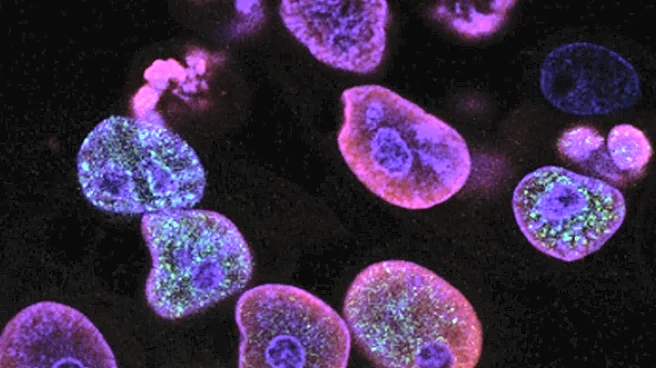What's Happening?
Research has demonstrated that andrographolide (AP) promotes the ex vivo expansion of CD34+ hematopoietic stem cells (HSCs) derived from human umbilical cord blood. The study found that AP increases cell viability and expansion, particularly at concentrations of 2.5 and 5 µM. AP treatment resulted in a higher number of BrdU+ cells and reduced senescence-associated β-galactosidase positive cells, indicating enhanced proliferation and reduced senescence. The study also showed that AP upregulates genes related to HSC stemness and modulates signaling pathways such as Wnt/β-catenin and Notch, which are crucial for HSC self-renewal and differentiation.
Why It's Important?
The ability to expand HSCs ex vivo has significant implications for regenerative medicine and stem cell therapy. By enhancing the proliferation and maintaining the stemness of HSCs, AP could improve the efficacy of stem cell-based treatments for various hematological conditions. This advancement may benefit patients requiring bone marrow transplants or those with blood disorders, offering a more reliable source of stem cells for therapeutic use. Additionally, understanding the mechanisms by which AP affects HSC expansion could lead to the development of new drugs targeting stem cell proliferation and differentiation.
What's Next?
Future research may focus on optimizing AP concentrations and treatment protocols to maximize HSC expansion while maintaining their multipotency. Clinical trials could be conducted to evaluate the safety and efficacy of AP-enhanced HSCs in therapeutic applications. Researchers may also explore the potential of AP in expanding other types of stem cells, broadening its applicability in regenerative medicine.
Beyond the Headlines
The study highlights the importance of understanding the molecular pathways involved in stem cell expansion and differentiation. Ethical considerations regarding the use of stem cells, particularly those derived from umbilical cord blood, must be addressed to ensure responsible scientific advancement. Long-term, AP could contribute to more effective and accessible stem cell therapies, but it requires careful regulation and oversight.








